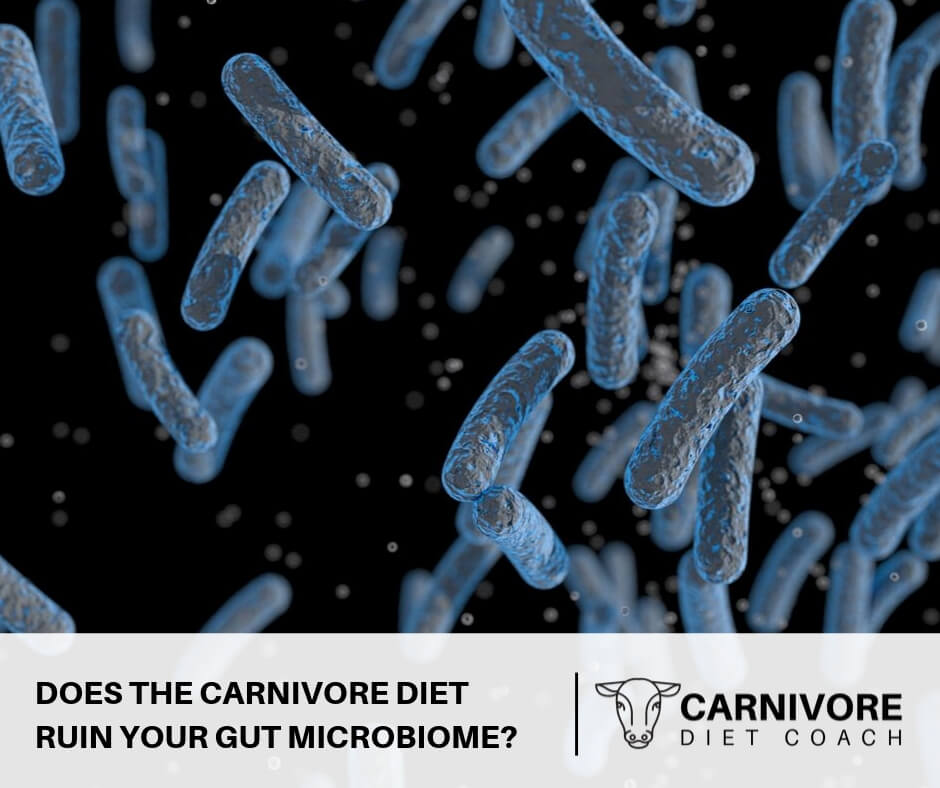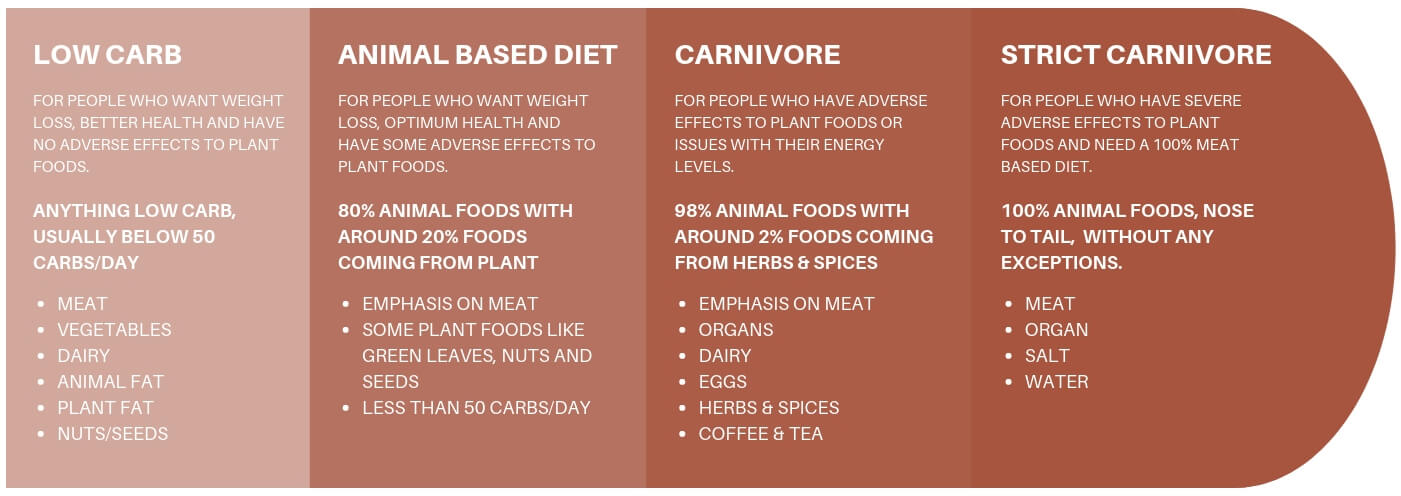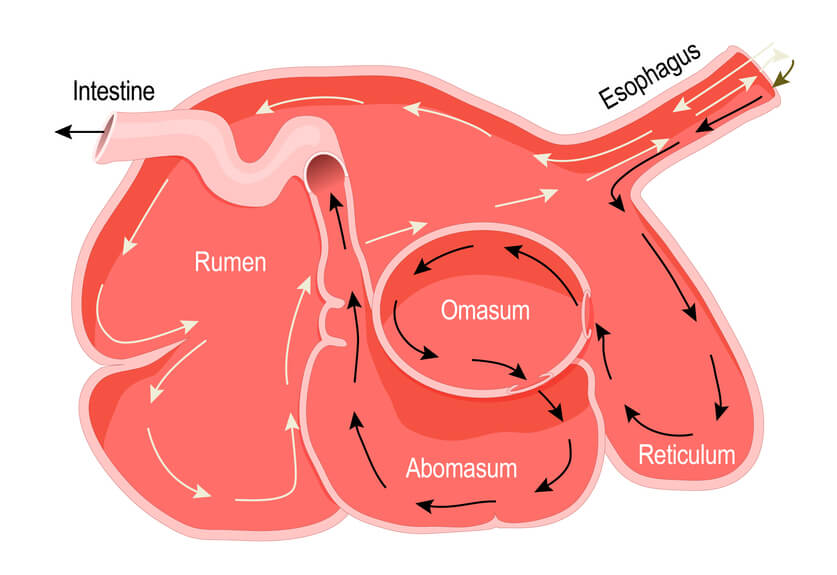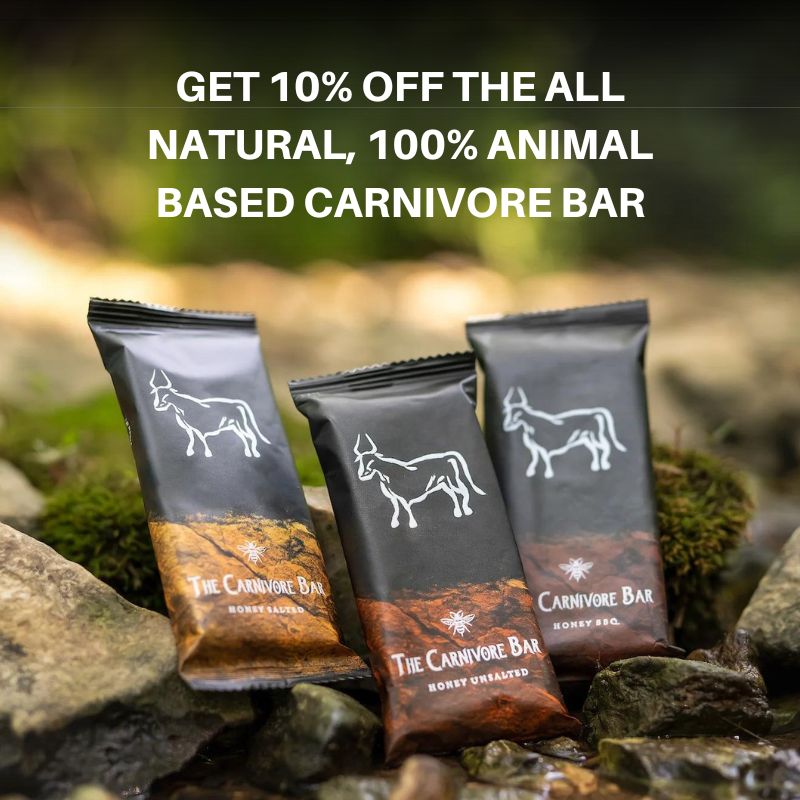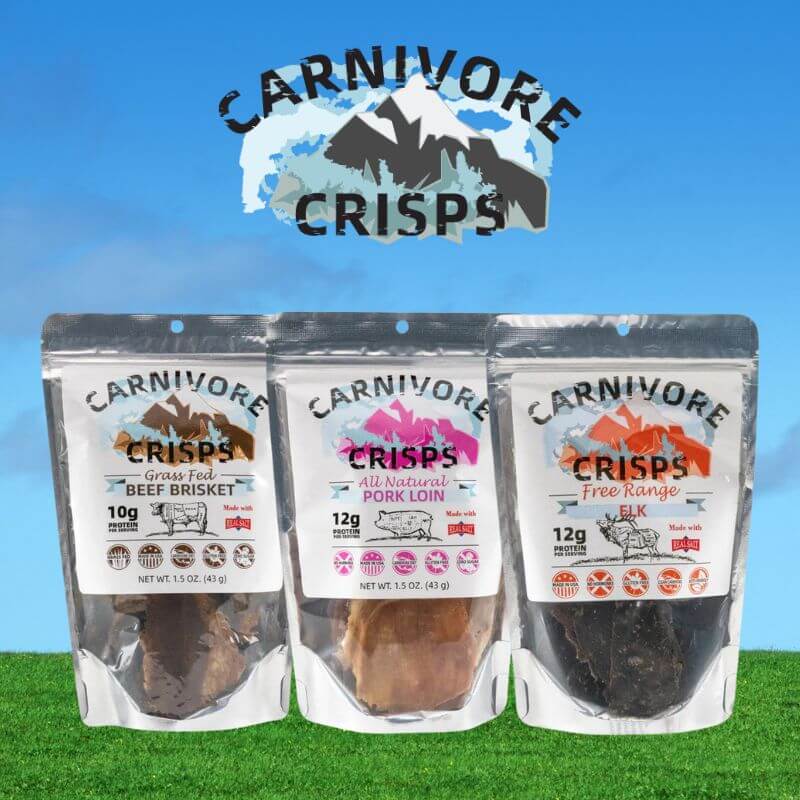|
THE COMPLETE
CARNIVORE DIET GUIDE
Learn how to lose weight, fix your gut and cure autoimmune symptoms with our free Carnivore Diet guide.
|
|
You’ve heard the expression, “you are what you eat.” It’s been a guiding aphorism in the popular discourse on food's effect on the body - and a pretty good one at that. But researchers are increasingly concluding that we’re less what we eat, and more what the bacteria in our gut eat. The microbiome - the community of organisms that live mainly in the lower bowel - has an outsized effect on our health, able to do things like lower cholesterol, reduce feelings of anxiety, and even reprogram our cells. Because it’s so essential, the question of how diet affects it naturally arises. There are growing noises that the carnivore diet could harm the human microbiome, but should we listen to them? Let’s take a look. What is the carnivore diet? The carnivore diet is predicated on the idea that humans thrive most when eating a diet entirely comprised of animal food. Those on the carnivore diet eat meat, milk, and eggs and eschew all other foods of plant origin, including beans, grains, fruits and vegetables. READ MORE: WHAT IS THE CARNIVORE DIET? The carnivore diet is different from both the paleo and Atkins diets. The driving force behind the paleo diet is that people should eat foods that their paleolithic ancestors ate, including some green veggies and the occasional helping of nuts and seeds. The Atkins diet is similar, focusing on animal foods, but it allows people to derive fat calories from plants, such as oils. The carnivore diet has a similar driving force as the paleo diet in the sense that it tries to mimic the food eaten by ancestral communities. Followers of the former, however, are less accepting of the idea that early humans derived substantial calories from plants. Most energy, the thinking goes, came from meat and fish, so these should form the vast bulk of the diet. People, the reasoning goes, aren’t biologically adapted to consuming the majority of their calories in the form of starches so they should avoid them. What is the gut microbiome? The gut microbiome is the name that scientists give to the community of bacteria that live in the small intestine and colon. It comprises a vast number of different types of species of bacteria, each competing with the others to derive energy from indigestible elements of the food we eat. The microbiome appears to have extreme importance in the lives of most vertebrates: everything from people to lizards. Bacteria and their hosts live in a mutually beneficial relationship. Animal guts provide bacteria with food that they can eat, and in return, animals get beneficial fatty acids and comfortable stools. Cows provide an excellent example of what's going on here. Cattle can’t digest the grass they eat directly. They haven't evolved the requisite mechanisms to do so themselves. The cool thing, though, is that they don’t have to. Instead, they co-opt bacteria that live in their gut to do the job for them. These bacterial specialists break down the indigestible plant sugars in their fodder, churning out fatty acids that the cows can then absorb for energy. The colony of bacteria living in the stomach comes in a variety of flavors. Researchers call these flavors an “enterotype.” Having a healthy enterotype means that a person has a community of bacteria living in their gut that affect their overall health positively. An unhealthy enterotype is the reverse - it negatively affects health. The accusation is that the carnivore diet leads to one of these harmful enterotypes, wrecking the health of the human host. But is it true? Do you need a diverse gut microbiome if you don't eat plants? Different species of bacteria in the gut eat both plant and animal matter. If you preferentially eat one type of food more than another, the balance of species in the stomach will change. Carnivores, like lions, have dramatically different gut microbiomes than hippos. Lions need bacteria that breaks down indigestible elements in meat, while hippos need those that’ll help them break down grass and reeds. Evidence suggests that people who eat more plants, like vegans, have more diverse colonies of gut bacteria compared to their meat-eating counterparts. Those on the carnivore diet, like predatory animals, by contrast, don’t require the same range of gut bacteria to break down food residues. They no longer need all the specialists to attack starches and indigestible sugars in plant matter that regular people eat. The flesh of one animal is, at a chemical level, identical to that of another, so fewer species are required. While it might seem that having a diverse microbiome would be beneficial, there’s no reason ahead of time to assume that this is the case. Specialist bacteria that breakdown plant cells might have positive effects, but they could also be entirely negative. We just don’t know at this point. Is it healthy in the long term? Changing your gut microbiome is a significant undertaking that requires a wholesale change in the food you eat. Making changes around the edges of your diet is unlikely to impact the diversity of species in your gut substantially. Most colonies of bacteria can survive on meager amounts of the food that they prefer. Whether the enterotype that results from the carnivore diet is healthy or not isn’t known yet by science. The long-term studies haven’t yet been done. There is, however, enticing early evidence that suggests that a less diverse gut microbiome could be beneficial for health. Researchers at the Institue of Agrochemistry and Food Technology in Valencia, Spain, found evidence that the diversity of gut bacteria might negatively affect health. Their study reviewed numerous findings throughout the scientific literature that seem to indicate that gut microbiota changes correlate with mental health issues. The evidence is not conclusive, but cutting out plants could be a possible strategy for those who have mental health conditions. The researchers said that a greater understanding of the mechanisms of gut flora diversity was needed before conducting interventions in human subjects. Wrapping up Right now, we don’t know the long-term effects of adopting the carnivore diet on the human microbiome. There’s a conspicuous lack of research in the scientific literature. What we do know, however, is that many historical populations lived on something like the carnivore diet in the eons before the neolithic revolution. What’s more, we have shining examples today of people who are thriving on the carnivore diet without any of the issues that mainstream science might predict.
There are hundreds of veteran carnivores like Shawn Baker, Amber O'Hearne, Jordan Peterson, and Mikayla Peterson who seem to be doing well but we need more research. When and where that research will come depends heavily on the carnivore diet gaining significant traction in the nutrition science community. At present, the mainstream view is that humanity would be best served eating something like the DASH or Meditteranean diet. While individual researchers are looking into the diet of groups like the Inuit and the Maasai who eat primarily animal products, it’s not the norm. The connection between the carnivore diet and the microbiome appears strong. There’s compelling evidence that switching to an animal food-based diet swiftly alters the composition of bacteria living in the gut. Beyond that, however, there’s little research on its merits, other than the smattering of studies we discussed above. At the moment, the best “evidence” that we have for the effectiveness of the carnivore diet and its safety long-term are the self experimenters. So far, it seems like people like Amber O’Hearne, Jordan Peterson, and Mikayla Peterson are doing well. Whether they continue to do so will be of great interest to the community of people living on this diet.
51 Comments
1/1/2020 11:02:18 pm
Interesting article. I’ve read up a lot about the gut microbiome and got sucked into the idea of feeding it specifically so I was taking lots of fibre supplements like potato starch, psyllium husk powder etc. Since going carnivore (approx 1 month ago) my digestion is much better! No more wind, GERD, heartburn, stomach pain, constipation, or excess hunger. I was taking antacids on a daily basis before this. I feel 100 times better eating this way and I’m looking forward to seeing other positive health benefits as I progress through this way of eating.
Reply
Gabriel
1/11/2020 08:05:53 am
Concise, understandable and up to date. Keep going. Thank you
Reply
Jonathan
2/23/2020 05:49:48 am
Thanks for the breakdown, it is something I struggle with being on the first month of the carnivore diet.
Reply
Dan
2/23/2020 06:16:00 am
Reduce your fat intake. Sounds like you're taking on more than you can handle right now.
Reply
By accident I found adding unfiltered unpasteurized mother in tact vinegar my carnivore bowel problems disappeared. I had been experiencing chronic diarrhea. Normal. I wish someone would research biome change but I expect no money to do this. All we can do is report improvement and no one accepts as science.
Reply
Ingegerd
9/14/2020 07:17:48 pm
To avoid cellular dehydration, take 1/8 tsp of a natural salt on the tongue to be absorbed, by the buccal mucosa, per every 12-16 oz of water you drink.
Reply
Angela
5/8/2021 04:16:32 pm
Reduce your protein intake. It’s very important to get enough fat and to not consume too much protein. (We found this out when my son had serious negative effects from too high protein consumption.) We knew it was important to increase fat but whenever we tried it caused diarrhea. So we had to eat more protein to get enough calories. Finally, we found valuable information on the Paleo Medicina (English site - clinic in Hungary) and cut our protein way back (200-260 grams) and were able to eat more fat (100-150 grams) without diarrhea. This also eliminated other negative effects.
Reply
TE
12/10/2021 09:13:52 pm
I know that when I take a. Boulardii probiotics helped with diarrhea
dan
12/23/2022 08:14:51 pm
How do you reduce protein intake if you are on carnivore? Literally, protein is all you have 24/7
Chris
5/17/2021 05:57:53 pm
There is a supplement called Kapex that I used to help my body digest fat. I was carnivore for 6 weeks and still getting the runs after meals. The fat was going straight through me. My body didn’t know what to do with it. When I started using kapex that problem completely stopped within a day or so. I think it has lipase in it? Good luck
Reply
Judy
6/27/2023 08:00:50 am
I took me almost two months to become fat adapted.
Reply
DRP
7/20/2023 10:05:54 am
although you may get some benefit in this diet there has been no evidence that it improves your long term wellbeing and in fat may be detrimental. Our #1 cause of death is heart and vascular disease. This diet has not been proven to decrease your risk of heart attack, stroke ,dementia or cancer IN HUMANS. so the jury is out. But a plant based diet has. ( not necessarily VEGAN but mostly plant) There is no 1 size fits all diet for microbiome but the more options you allow your gut and your self the better
Reply
DRR
9/5/2023 11:12:54 am
You are probably correct. However, there are many things we don't know. I am a doctor and I have gut dysbiosis, multiple sclerosis and Lyme disease. Every medicine and treatment (natural or pharmacologic) has made me worse. I have difficulties with balance (neurologic dysequilibrium and proprioceptive), muscle spasticity and brain fog. In one month on the Lion Diet, my balance has improved, my muscle spasticity has been cut in half and my brain fog is gone. This is coming back from a starting point of almost my lowest health and quality of life to date. I'll see what comes in the future, but I'm staying on this diet for a bit.
Bovodar
12/19/2023 06:53:15 pm
A plant-based diet is a poverty diet. Grains especially are not consumed because they're good for us (they're just grass after all) but because the shift to sedantism and urbanization meant that a meat-based diet was not practical for the new population densities.
Jess
6/19/2024 11:57:41 am
Hey Johnathan, are you still on either coffee or any type of sweeteners whatsoever? Both of these can cause diarrhea in the beginning stages according to Dr.Anothony Chaffee. He also says closely monitoring your stool is the best way to figure out what ammount of fat is correct for you. Runny stool =potentially to much fat or the result of coffee/sweeteners.. dry stool = not enough fat. Keep in mind it takes time to become fat adapted. And recovering from illness takes time. It took your body many years to get where it is today, give it time to heal. As to gut diversity, kefir and yogurt are excellent sources of healthy bacteria.
Reply
Sophie
8/20/2020 07:29:29 am
Anyone know how carnivore helps with C.Diff infection? I recently contracted it while taking antibiotics for something else and have now been given yet more antibiotics to clear it and instructed ot eat dry white toast, porridge, crackers and boiled potatoes:'( totally going back on my wonderful carnivore diet which saw me lose 15lbs during my first 2 weeks! I know a healthy (not necessarily diverse) gut microbiome is the key to avoiding reccurrance of C.Diff and I am terrified this will come back when the antibiotics used to treat it finish.
Reply
Renske Poortman
1/24/2023 11:52:37 pm
I'm replying kind of late but you could go to rebekka s farmer on YouTube or Instagram... She has concurred c diff and a ton of anther health issues.
Reply
Hi Sophie- I’ve been 95% CV for over 2 years. About 2 wks ago I was diagnosed with C-Diff too. Did a 10 day course of Vancomycin which destroys all your gut biome. I’m 6 days out from my last dose- I think it may be coming back. CV & Keto put my IBS into remission. I’m taking Florastor & some other probiotic’s to rebuild my biome.
Reply
Howard Kaplan
9/15/2020 08:47:47 pm
If someone could give me an example of a bacterium that uses waste from animal foods as a fuel, I'd love to hear it. To my knowledge--and that may be the problem--the only fuels bacteria use are glucose, cellulose, and organic solvents. I know of no carnivore consuming any of those. Animal foods are wholly digested in the stomach and absorbed in the small intestine--that's where your nutrition is derived. The colon serves to eliminate the small amounts of waste that remains. What purpose would bacteria serve in there?
Reply
Ralph
8/31/2022 03:48:19 pm
Howard, do you follow a carnivore diet? If so, how long have you been on it? Do you know how it would work with someone (me) with diabetes and heart disease? I've read of reversal of diabetes by fixing the gut microbiome.
Reply
Emily
1/18/2023 10:50:49 am
Carnivore animals do have a gut microbiome. All animals have many of them. We have a mouth biome, skin biome, vaginal biome etc. Microbes are literally everywhere on us and in our environmentand there are so many that can live in harsh environments. They eat far more than what you've listed. There are microbes that live in underground steam vents with boiling hot water! If a carcus is rotting on the ground, microbes are what is breaking it down, making it eventually disappear. I think the bacteria that break down protien are called proteolytic. But the microbiome doesn't only consist of bacteria. It consist of many microbes like fungus/yeasts, harmless worms and even beneficial parasites that train the immune system to prevent autoimmunity.
Reply
5/1/2024 08:04:13 pm
Your perspective is interesting to me …. I took a nutrition course and a gut health course that explained the microbiome and I understood it to be part of our immune system… we feed and keep a healthy microbiome to help fight bad bacteria… however it seems like everything I learned in both courses I’m wondering if it’s all outdated… I’ve been on a plant based diet for many years but my A1C is a little high… that has caused me to do more research and learning about the Carnivore diet is contrary to everything I learned… I was vegetarian for many years thinking it was the healthiest diet ever.. I’m looking at Keyo just in case my microbiome needs the few fruit and vegetables to thrive and help keep my immune system strong.. I have not taken medication 💊 for 30 years… I’m 75 and i count on my immune system and natural remedies if ever I get any symptoms like a cold or flu… no medicine 💊
Reply
Roberto
3/1/2021 07:33:10 am
Honest HATE the stupid POP-UPS on your website that say "So And So from So and So started a free trial"... For that reason alone I say screw you!
Reply
Dan Salcumbe
4/3/2021 04:21:10 am
Then go somewhere else to get your free information lol.
Reply
Paula
4/3/2021 04:08:39 am
I agree ... the popups annoyed me so much as I read that I could hardly read the page.. ugh
Reply
Peter
2/4/2022 03:36:25 pm
I didnt not even notice let alone mind the popups.
Reply
Christina M
2/17/2022 02:18:17 pm
Me too with that stupid pop up.... Move it to the right at least.... sheesh
Reply
Ronald Evans
7/28/2022 09:34:29 am
I'm constipated on the carnivore diet. Would more protein or fat help it's because of a medication I'm taking I cannot stop right now.
Reply
Arlin
8/3/2022 07:13:54 am
Try adding more fat. Usually people have diarrhea if they eat too much fat due to a lack of enough bile to digest it all.
Reply
6/23/2023 06:03:21 am
Yeah. Constipation is easily solved by adding fat. Or else you can try adding dairy.
Reply
Jo
1/12/2023 12:03:12 pm
I would be interested in seeing an update of this article in light of the last couple of years of new research.
Reply
Dan Salcumbe
1/12/2023 05:09:21 pm
Hey Jo,
Reply
Katie
2/6/2023 10:02:52 pm
Hello Jo! I would be extremely interested in the pro and pre biotics you are taking, as well as what plants you are eating. I am 6 weeks on the carnivore diet, I know that’s not very long. At this point I dislike the diet to the point that I will finish my 90 days I set out for myself, and then start to test plant foods to see how I tolerate them. I am seeing great mental health improvement, but my physical pain and other issues are not improving.
Reply
6/23/2023 06:08:44 am
Microbes eat animal foods as well. Just make sure to eat a diversity of animal food when also introducing new bacterial strains from probiotics. So, eat a diversity of meat (beef, chicken, lamb, pork, etc), organ meats, fish, bone broth, eggs, dairy (maybe from multiple sources: cows, goats, sheep, etc). And when you eat animal foods, eat all parts of it, such as the skin and connective tissue. Hi Jo- Your experience is so similar to mine. I had IBS & was in denial. I started Keto about 5 yrs ago and within 6 mos no more IBS symptoms. After 2 yrs I transitioned to CV- I’ve been on that for over 2 yrs. I just got C-Diff which is a bacterial infection of the gut. Just did a 10 course of antibiotics to rid it. I appreciate you sharing your story. I now need to rebuild my biome and think I need more diversity. I will seek out someone I can work with to test my biome. Thank you SO much for sharing your story!
Reply
6/23/2023 06:06:00 am
Diet doesn't solve all problems. You might not be able to get rid of unhealthy bacterial growth without introducing health bacteria that can rebalance the microbiome. Unless you're eating raw or high meat, a carnivore diet won't likely introduce any new bacteria. So, you'd need to take a probiotic.
Reply
Sue
6/12/2024 12:59:11 am
That's awesome , my daughter has UC so we trying out the carnivore diet for the past 2 weeks . Seems to be working . What pre and pro biotics are you on ?
Reply
John
2/9/2023 11:28:08 am
I wanna know what the author has to say about the multipe studies showing:
Reply
Dan Salcumbe
2/9/2023 05:35:27 pm
Hey John. I have nothing to say about those studies. I've read them but I'm also aware that the gut "experts" self admittedly say they have no idea how the gut microbiome works.
Reply
6/23/2023 06:11:36 am
None of those studies were done on a carnivore diet. Typically, the comparison is between the standard American diet (SAD) and some supposedly healthy plant-based diet. But what is ignored is most of the food on SAD are from plants: bread, crackers, chips, noodles, rice, root vegetables, seed oils, sugar, honey, etc. We have to learn to have intelligent and informed discernment in looking at such research.
Reply
"Specialist bacteria that breakdown plant cells might have positive effects, but they could also be entirely negative. We just don’t know at this point."
Reply
James
8/2/2023 09:32:59 am
The bacteria you quote grow on milk don't they, which has no fibre. I have 2 autoimmune diseases and when I tried to increase my gut bio diversity via a plant based diet, my autoimmunes really flared up. So although having gut microbe diversity may help normal healthy people, it may be that people who have autoimmune conditions find relief in having less microbes in the gut? Maybe the immune system doesn't get triggered as much with less diversity? I honestly wish I knew the answer because I've been on every medicine possible and run out of medicinal options. Carnivore is where I have ended up.
Reply
Jay
8/12/2023 03:45:16 pm
How does the carnivore diet differ from Dr. Kwasniewski's Optimal diet, where many of the adherents died from stomach cancer after many years on the diet?
Conor
6/25/2024 11:05:25 pm
You’re an ‘expert’ on the microbiome when it comes to a carb fuelled diet but you have no clue whether you can draw the same conclusions when it comes to people living on a fat fuelled very low fibre diet. It has not been studied enough. The two microbiomes are going to be very different. Just admit your ego is tied up in your beliefs, the microbiome is still vastly misunderstood and understudied especially when it comes to the carnivore diet.
Reply
Stefan
7/26/2023 12:26:23 am
What indigestible elements are there in meat?
Reply
Dano
8/15/2023 07:43:57 pm
Guess what? It turns out that we don't need to do oil changes in our cars. Ignore what you've been told, it's all a giant scam. I stopped changing the oil and my car runs perfectly fine even after 5 years and counting. I'm saving a fortune!
Reply
Cuju
6/21/2024 01:17:43 pm
This is very important. Genetics and epigenetics determine the majority of our gut microbiome composition and diversity. Diet determines an important part and variation in diet can alter the microbiome somewhat, but not completely. Peoples from different parts of the world have survived and thrived on vastly different diets, and that's partially why humans have been so successful - because we can adapt.
Reply
Kevin
3/5/2024 11:49:21 am
I'm no expert, but from what I understand, gut bacteria can survive off of mucin, a component of mucus that lines the gut. This sounds like the bacteria is eating away at the gut lining, but the mucin regenerates itself and produces more mucin than they can eat. This explains why people who are on a carnivore diet still have BM's since stool is comprised in-part of dead gut bacteria. All I know is that when I was younger, I didn't eat much fiber or even healthy, but I never had any gut issues. Only as I've gotten older and tried to eat "healither" (more vegetables) did I develop GI problems. You may be onto something that more isn't always better.
Reply
Leave a Reply. |
Carnivore Diet Recipes & Meal PlansOur Trusted Partners
Popular Guides
|


